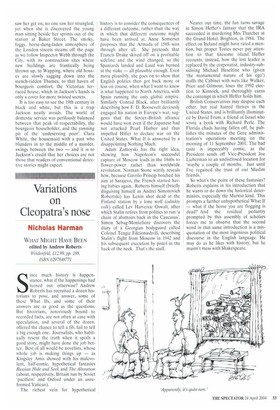Variations on Cleopatra's nose
Nicholas Harman
WHAT MIGHT HAVE BEEN edited by Andrew Roberts Weidenfeld, £12.99, pp. 188, ISBN 0297848771 Since much history is happenstance, what if the happenings had turned out otherwise? Andrew Roberts has recruited a dozen historians to pose, and answer, some of these What Ifs. and some of their answers are as good as the questions. But historians, notoriously bound to recorded facts, are not often at ease with speculation, and several of the dozen, offered the chance to tell a fib, fail to tell a big enough one. Journalists, who habitually resent the truth when it spoils a good story, might have done the job better. Best of all would be novelists, whose whole job is making things up — as Kingsley Amis showed with his malevolent, half-comic, hypothetical fantasies Russian Hide and Seek and The Alteration (about, respectively, Britain run by Soviet 'pacifiers' and Oxford under an unreformed Vatican).
The richest vein for hypothetical
history is to consider the consequences of a different outcome, rather than the way in which that different outcome might have been arrived at. Anne Somerset proposes that the Armada of 1588 won through after all. She pretends that Francis Drake skived off on a profitable sideline and the wind changed, so the Spaniards landed and Laud was burned at the stake — all plausible enough. Even more plausibly, she goes on to show that English politics then got back more or less on course, when what [want to know is what happened to North America, with Spain running the only global empire. Similarly Conrad Black, after brilliantly describing how F. D. Roosevelt deviously engaged his nation in Europe's war, suggests that the Soviet–British alliance would have won even if the Japanese had not attacked Pearl Harbor and thus impelled Hitler to declare war on the United States. What If is answered by a disappointing Nothing Much.
Adam Zamoyski has the right idea, showing how Napoleon's successful capture of Moscow leads in the 1840s to flower-power rather than worldwide revolution. Norman Stone wittily reveals how, because Gavrilo Princip botched his aim at Sarajevo, the French started having babies again. Roberts himself (briefly disguising himself as Andrei Simonovich Robertski) has Lenin shot dead at the Finland station by a lone wolf (odinkly yolk) called Lev Harveivic Oswalt, after which Stalin retires from politics to run 'a chain of abattoirs back in the Caucasus'. Simon Sebag-Montefiore discovers the diary of a Georgian bodyguard called Colonel Tengiz Fiktionashvili, describing Stalin's flight from Moscow in 1942 and his subsequent execution by pistol in the back of the neck. That's the stuff. Nearer our time, the fun turns savage in Simon Heffer's fantasy that the IRA succeeded in murdering Mrs Thatcher at the Grand Hotel. Brighton, in 1984. The effect on Ireland might have rated a mention, but proper Tories never pay attention to that tiresome island. Heffer recounts, instead, how the lost leader is replaced by the corporatist, industry-subsidising Michael Heseltine who (given 'the monumental nature of his ego') stuffs the Cabinet with wets like Walker, Prior and Gilmour, loses the 1992 election to Kinnock, and thoroughly earns the contempt in which Heffer holds him.
British Conservatives may despise each other, but real hatred thrives in the United States, and is brilliantly illuminated by David Frum, a friend of Israel who wrote a book with Richard Perle. The Florida chads having fallen off, he publishes the minutes of the Gore administration's operations meeting on the morning of 11 September 2001. The bad taste is impeccably comic, as the President sends off Vice-President Joe Lieberman to an undisclosed location for 'maybe a couple of months. Just until I've regained the trust of our Muslim friends.'
So what's the point of these fantasies? Roberts explains in his introduction that he wants to do down the historical determinists, especially the Marxist kind. This prompts a further unhypothetical What If — what if the horse you are flogging is dead? And the residual pedantry prompted by this assembly of scholars forces me to observe that the second word in that same introduction is a misquotation of the most ingenious political discourse in the English language. He may do as he likes with history, but he mustn't mess with Shakespeare,


















































































 Previous page
Previous page